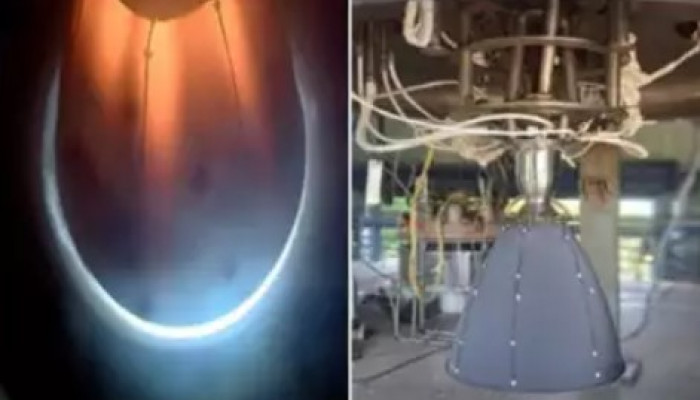ISRO achieves breakthrough with lightweight, innovative nozzle for rocket engines
- In Reports
- 05:06 PM, Apr 16, 2024
- Myind Staff
ISRO announced a significant advancement in rocket engine technology, revealing the successful development of a lightweight Carbon-Carbon (C-C) nozzle for rocket engines. This breakthrough is expected to improve payload capacity.
The Vikram Sarabhai Space Centre (VSSC), a part of ISRO, has achieved a significant innovation. This development promises to improve crucial parameters of rocket engines, such as thrust levels, specific impulse, and thrust-to-weight ratios. As a result, it is expected to increase the payload capacity of launch vehicles.
According to a statement from ISRO, the Vikram Sarabhai Space Centre (VSSC) in Thiruvananthapuram has used advanced materials such as Carbon-Carbon (C-C) composites. This effort has resulted in the development of a nozzle divergent with exceptional properties.
The space agency stated that through methods such as carbonisation of green composites, chemical vapour infiltration, and high-temperature treatment, it has manufactured a nozzle. This nozzle exhibits low density, high specific strength, and excellent stiffness. Additionally, it retains mechanical properties even at elevated temperatures.
ISRO highlighted a crucial aspect of the C-C nozzle, emphasising its unique anti-oxidation coating of silicon carbide. This coating extends the operational limits of the nozzle in oxidizing environments. The innovation serves to decrease thermally induced stresses and improve corrosion resistance. Consequently, it enables the extension of operational temperature limits in challenging environments.
The substitution of metallic divergent nozzles with C-C counterparts in the PS4, the fourth stage of the PSLV, is anticipated to increase the payload capability by 15 kg, marking a notable advancement for space missions. ISRO highlighted the potential impact of this development, particularly for its PSLV launcher, a key component of its space programme.
The successful testing of the C-C nozzle divergent was a significant milestone for ISRO. On March 19, 2024, a 60-second hot test took place at the High-Altitude Test (HAT) facility in the ISRO Propulsion Complex (IPRC), Mahendragiri, Tamil Nadu, confirming the system’s performance and hardware integrity.
Further validation of the nozzle’s capabilities was conducted through subsequent tests, including a 200-second hot test on April 2, 2024. These tests confirmed the nozzle's performance, with temperatures reaching 1216 K, aligning with predictions.
The collaborative effort involved the Liquid Propulsion Systems Centre (LPSC) at Valiamala near Thiruvananthapuram, responsible for designing and configuring the test, and IPRC, which executed the tests at its HAT facility.
Image source: Times of India







Comments